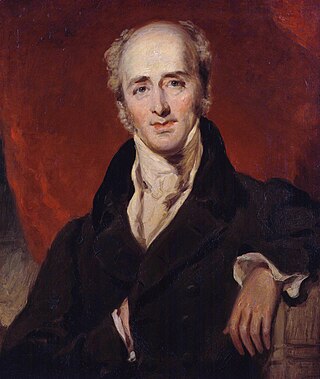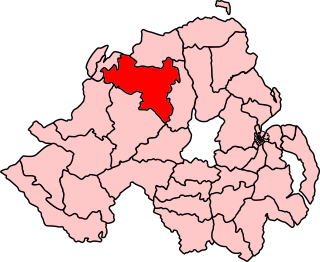
The 1832 United Kingdom general election was held on 8 December 1832 to 8 January 1833, to elect members of the House of Commons, the lower house of Parliament of the United Kingdom. It was the first held in the Reformed House of Commons following the Reform Act, which introduced significant changes to the electoral system.

The 1921 Irish elections took place in Ireland on 24 May 1921 to elect members of the House of Commons of Northern Ireland and the House of Commons of Southern Ireland. These legislatures had been established by the Government of Ireland Act 1920, which granted Home Rule to a partitioned Ireland within the United Kingdom.
There were two elections in Ireland on 24 May 1921, following the establishment of the House of Commons of Northern Ireland and the House of Commons of Southern Ireland under the Government of Ireland Act 1920. New constituencies were established for both parliaments. A resolution of Dáil Éireann on 10 May 1921 held that these elections were to be regarded as elections to Dáil Éireann and that all those returned at these elections be regarded as members of Dáil Éireann. According to this theory of Irish republicanism, these elections provided the membership of the Second Dáil. The Second Dáil lasted 297 days.

The 1925 Northern Ireland general election was held on 3 April 1925. It was the second election to the Parliament of Northern Ireland. It saw significant losses for the Ulster Unionist Party, although they maintained their large majority. This was the last election for the Stormont parliament conducted using Single transferable voting, a form of Proportional Representation. Fifty-two members were elected in ten districts, which each elected between four and eight members. The Ulster Unionist government abolished proportional representation during this parliament and replaced it with the first-past-the-post system used in Great Britain.

The 1945 Northern Ireland general election was held on 14 June 1945. The election saw significant losses for the Ulster Unionist Party, though they retained their majority.

The 1962 Northern Ireland general election was held on 31 May 1962. While the Ulster Unionist Party lost three seats, they retained a large majority as in all previous elections to the Parliament of Northern Ireland.

The 1958 Northern Ireland general election was called on 27 February by 1st Viscount Brookeborough to be held on 20 March 1958.

The 1953 Northern Ireland general election was held on 22 October 1953. Like all previous elections to the Parliament of Northern Ireland, it produced a large majority for the Ulster Unionist Party.

The 1949 Northern Ireland general election was held on 19 February 1949. The election became known as the Chapel-gate election because collections were held at churches in the Republic of Ireland to support the Nationalist Party campaign.

The 1938 Northern Ireland general election was held on 9 February 1938. Like all previous elections to the Parliament of Northern Ireland, it produced a large majority for the Ulster Unionist Party, who won three-quarters of the seats.

The 1933 Northern Ireland general election was held on 30 November 1933. Like all previous elections to the Parliament of Northern Ireland, it produced a large majority for the Ulster Unionist Party.

The 1929 Northern Ireland general election was held on 22 May 1929. Like all previous elections to the Parliament of Northern Ireland, it produced a large majority for the Ulster Unionist Party. It was the first held after the abolition of proportional representation and the redrawing of electoral boundaries to create single-seat constituencies. As with the rest of the United Kingdom, this has made it more difficult for independent and minor party candidates to win seats.

South Fermanagh was a constituency of the Parliament of Northern Ireland.

Enniskillen was a constituency of the Parliament of Northern Ireland.

Lisnaskea was a constituency of the Parliament of Northern Ireland. It was located in County Fermanagh and included the namesake town of Lisnaskea.

Mid Londonderry was a county constituency comprising the central part of County Londonderry. It was created in 1929, when the House of Commons Act 1929 introduced first-past-the-post elections throughout Northern Ireland. It was one of five single-member constituencies replacing the former five-member Londonderry constituency. The constituency survived unchanged, returning one member of Parliament until the Parliament of Northern Ireland was temporarily suspended in 1972, and then formally abolished in 1973.
Mid Down was a constituency of the Parliament of Northern Ireland.
West Down was a constituency of the Parliament of Northern Ireland.
North Down was a constituency of the Parliament of Northern Ireland.
Iveagh was a constituency of the Parliament of Northern Ireland.
















